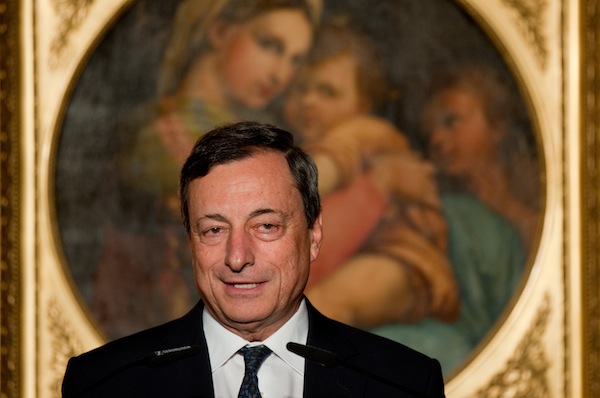David Cameron and François Hollande met this evening. As you would expect, they discussed the situation in the eurozone, which is currently looking a little more cheery than usual after Mario Draghi announced those long-awaited ‘whatever it takes’ measures which he believes will save the eurozone. In summary, this Outright Monetary Transactions scheme involves the European Central Bank buying up short-term debt from struggling economies. To stop this cash from the ECB becoming a substitute for economic reforms, a country wanting to apply for the OMT must have signed up to certain conditions with the European Financial Stability Facility or the European Stability Mechanism.
Those conditions mean austerity policies, which the key country likely to benefit from the OMT, Spain, is going to find difficult to implement given youth unemployment now stands at 50 per cent, with general unemployment at 25 per cent. Spanish Prime Minister Mariano Rajoy insisted today that the country had still not asked for a bailout. The Bundesbank is opposed to the plan, and its chief, Jens Weidmann, was the only member of the Bank’s 23-strong governing council to vote against it. But the markets have, for the time being, responded well to the announcement. The IBEX was nearly five per cent higher at close.
Cameron expressed relief at the announcement this evening, saying:
‘I warmly welcome what Mario Draghi and the European Central Bank have done today. I’ve said for two years now that we need a European Central Bank that stands firmly and squarely behind the euro currency, and that is prepared not just to make those statements but back them with real financial muscle and a clear plan. I think we are closer to that today than we’ve been for a very long time. I warmly welcome those steps having been taken. It is clearly important for the countries of the eurozone but it is also important for countries like Britain, where we do so much of our trade with eurozone countries like France, Spain, Germany and of course all the others.’
Don’t forget that this announcement is aimed at saving the euro. Critics would argue the OMT might stave off a disaster for a while, but it doesn’t address the fundamental problems at the heart of the single currency, which those sceptical about its conception pointed out all those years ago, and which will continue to rumble on.







Comments